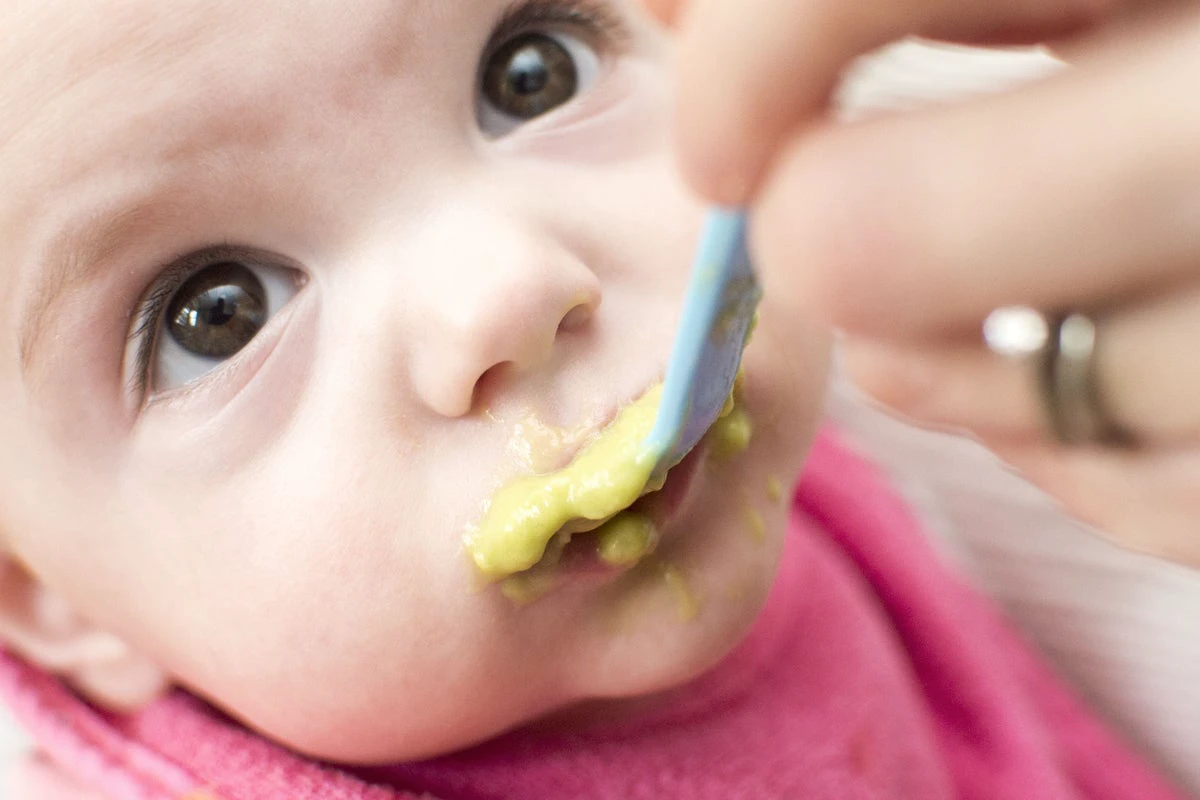Baby food manufacturers have been given 18 months to cut sugar and salt in their products, to address concerns that infants’ development is being harmed by poor diets.
Accompanying new guidelines to clarify labelling on baby food will help parents make informed choices about what they feed their children, the Department of Health and Social Care said.
Manufacturers will be challenged to change the recipes for their products to reduce levels of salt and sugar, without the use of sweeteners, which are not permitted for use in commercial baby food.
For example, baby desserts and breakfasts such as rice pudding, custard and ready-to-eat fruity porridge should contain less than 10g of total sugar per 100g, while baby meals should have no more than 60mg of salt per 100 calories or 100mg per 100 calories if cheese is included in the recipe.
The guidelines will also tackle misleading labelling that often conflicts with official feeding advice.
For example, some products labelled as snacks for babies from seven months on directly contradict government recommendations that children aged between six and 12 months do not need snacks between meals, only milk.
Manufacturers will also be told to stop using misleading marketing claims that make products appear healthier than they are, for example products with labels such as “contains no nasties” when they may be high in sugar.
The move comes as data from the National Diet and Nutrition Survey, published in June, shows that more than two thirds of children aged 18 months to three years are eating too much sugar, while more than a fifth of children aged four to five years are overweight or living with obesity in England.
High sugar intake in children’s diets is a significant factor contributing to high rates of childhood obesity in the UK, which is among the highest in western Europe.
Obesity rates have doubled since the 1990s, including among children.
Obesity costs the NHS £11.4 billion a year and is one of the root causes of diabetes, heart disease and cancer.
Public health minister Ashley Dalton said: ”Every child deserves a healthy, happy start to life. But babies’ development is being harmed by poor diets and unhealthy food, holding them back and piling up pressure on the NHS.
“Too often, parents are bombarded with confusing labels, disguising unhealthy foods packed with hidden sugars and salt.
“Our plan for change will tackle this, giving parents the information they need and providing children with good nutritious food.
“I’m determined to make it far easier for parents to keep their children healthy.
“From working with influencers to get children exercising, to banning junk food ads near schools, our 10-year health plan will help kids today be part of the healthiest generation of children ever.”
Katharine Jenner, director of the Obesity Health Alliance, said: “For too long, commercial baby foods have been promoting high-sugar products disguised as ‘healthy options’, using misleading packaging.
“These new guidelines put the industry on notice: this practice must end.
“Making it easier for parents to buy healthier products is a baby step in the right direction – but what’s really needed is a giant leap.
“It should not even be possible to sell baby food that goes against official feeding guidance, and the public agrees, with three in four people supporting a ban on high-sugar baby foods.
“If the industry fails to act quickly, the Government must step in with mandatory rules to set children up for a lifetime of good health.”
Dr Kawther Hashem, head of research and impact at Action on Sugar, said: “Our research has consistently shown excessive levels of sugars in commercial baby foods.
“These long-overdue voluntary guidelines are a step in the right direction, but they must not be the final word.
“Consuming too much sugar on a regular basis means children are taking in excess calories that, if not used for energy, are stored as fat.
“This increases the risk of weight gain and, if it starts early, that excess weight is often carried into adolescence and adulthood, raising the risk of overweight, obesity and agonising tooth decay.
“If we’re serious about protecting our youngest children, these guidelines must be made mandatory.
“We urge the Government to closely monitor progress and act swiftly if companies fail to change.”
Professor Simon Kenny, NHS England’s national clinical director for children and young people, said: “I can’t overstate just how important good nutrition is during these formative months for babies’ health in the long term, and you can’t beat fresh foods.
“Reducing the salt and sugar levels in shop-bought baby food is a really important step, and these new guidelines alongside clearer labelling will help empower busy parents to make nutritious choices that give their children the best possible start in life.”
Dr Hannah Brisden, head of policy and advocacy at the Food Foundation, said: “Giving every child the best start in life begins with good nutrition.
“Today’s announcement on commercial baby foods highlights the need to protect families from aggressive marketing and end misleading claims on sugary products.
“Our research found up to 43 claims on a single baby snack, despite many being high in sugar.
“The industry has been warned to clean up their act with voluntary guidelines, but to truly protect children, mandatory standards are needed.
“We urge the Government to monitor progress closely and be ready to step in if companies don’t act.”
